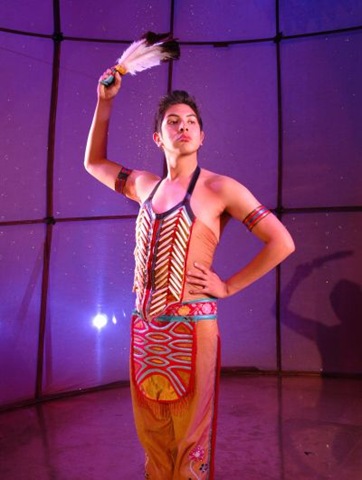Agokwe: sweet, comic, and tragic (but not subversive)

Created and performed by Waawaate Fobister, Agokwe tells the story of two young Anishnaabe men whose first love is painfully distorted by their community's small-mindedness and homophobia. The story focuses on the early unrequited the attraction between Jake -- who is sensitive and self-aware, if not entirely at ease with his sexuality -- and Mike -- a hockey star from the neighbouring community who is struggles to hide his orientation.
--- warning spoilers ahead ----
Fobister performs all of the characters in Agokwe, principle and supporting. These include Mike's mother –- a tough but kindhearted recovering alcoholic -- Goose, Jake's sexy, overbearing cousin, and Cheyenne, the unwitting girl who is matched to Jake by his cousin in hopes of "saving his reputation." The story is framed by monologues from a crude and lusty Nanabush -- also Fobister -- dressed in a glossy raven-headed mask and a glittering winged cape.
The narrative structure is fairly conventional: we follow Jake and Mike from their first tentative glances to their first kiss. Their path to bliss is complicated by the machinations of Goose, who wants the hockey star for herself. She contrives for Jake to lose his virginity to Cheyenne, and hopes that Cheyenne will return the favour by setting her up with Mike. When the plan comes to nothing, and instead Goose catches the two young men in a passionate embrace, she vows revenge. After lingering on every detail leading up to this point, the story then skips ahead one year. We find that Jake -- having weathered community gossip -- is out and proud, and Mike – unable to bear the public humiliation – has committed suicide. It's a sweet romance with a painful resolution, but it's also predictable. Sitting in the audience, I felt as though I could hear the plot points clicking into place: a closeted romance, a long journey towards confessions of mutual attraction, and the inevitably tragic separation that comes to star-crossed lovers.
As a performer, Fobister is courageous, energetic, and funny. He defines his characters well, imbuing Jake with gentle body language and Mike with an athlete's swagger. He invests Nanabush with a larger-than-life personality appropriate to a supernatural being and the lascivious cheek appropriate to a Trickster (at one point Nanabush even asks an audience member to slap his ass). Fobister's accomplishment with this work should be applauded: with no supporting performers to lean on, he drives the entire show with his own energy and charisma. That said, there are weaknesses of characterization in Agokwe that I did find distracting. Nanabush's gravely voice filtered into other characters' dialogue, flattening some of the careful distinctions between them. Fobister also has a tendency to overplay dramatic moments that (in my opinion) would be more effective if understated -- for example, a crucial scene in which a tearful Mike prays to the Creator to be made “normal.”
Of the things that were missing in Agokwe, the key lack for me was this subtlety. I would have liked to see more nuanced conversations and more three-dimensional characters. Jake and Mike are relatively well-rounded, in the sense that we are made privy to their feelings and inner lives. Goose, the villain, is portrayed as wholly egotistical and ignorant. And while there are certainly malicious people of her ilk in the world, her shallowness robs the story of some emotional complexity and lessens the impact of her betrayal.
I also found myself wishing for a deeper exploration of the concept of “agokwe.” As it is used in this play, the word basically becomes a synonym for gay, and replaces the cruel slurs used by community members. We are told more than once that agokwe or “two-spirit” describes a person who has the emotional and spiritual capacity to transcend the binary of male and female or “fire and ice.” Yet the play does not delve into the significance of this idea, beyond simply using it to describe men whose romantic and sexual preference is for men.
I found it interesting, for instance, that the play focused almost completely on the heroically “masculine” accomplishments of Mike the hockey player. We are told that Jake is a Grass Dancer of incomparable grace, but we never see him dance. This detail, and its rich potential for subverting social norms, was under-explored. It also struck me as odd that a in story that suggests questioning gender norms and integrating male- and femaleness, the female characters were flat and abrasive.
Agokwe tells a poignant tale about two men in love whose community fails to support them, but it doesn't fully succeed in articulating the alternative vision of two-spiritedness promised by the title.



